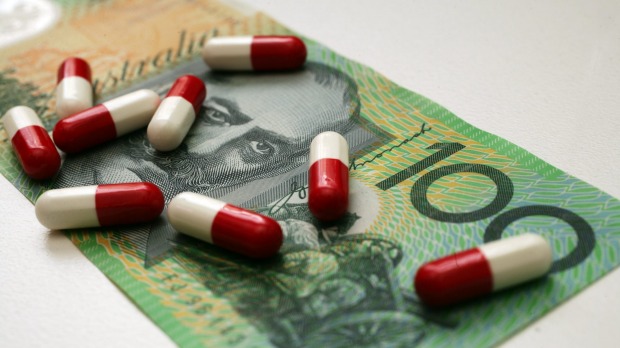
A new code of conduct for the pharmaceutical industry has been approved by the ACCC. Photo: Rebecca Hallas
Patients will find out what payments and “educational” trips their doctors have received from drug companies, after the Australian Competition and Consumer Commission approved a new code of conduct for the pharmaceutical industry.
But in a change criticised by health consumer groups, companies will no longer be required to report how much they spend wining and dining doctors.
The new Medicines Australia code of conduct, which is expected to come into force next month, says companies must not spend more than $120 per person per meal on food and drinks, but does not require the disclosure of this spending, and drops the current requirement for companies to publicly report the total amounts they spend on such hospitality.
The Consumers Health Forum said the more detailed reporting of “transfers of value”, which will enable patients to see what individual doctors have received from drug companies in speaking and consulting fees, and flights and accommodation, was an “important step forward.” The new code closes a loophole in an earlier draft which would have allowed doctors to opt out of the system.
But chief executive Leanne Wells said by agreeing not to require companies to disclose spending on meals, it had opened a $120 “free lunch flaw”.
“That would seem to make it possible for companies to entertain doctors to a decent meal frequently, without the matter coming to the notice of patients or the public,” Ms Wells said.
The ACCC said requiring companies to continue to report spending on food and beverages would impose a “significant administrative burden” on companies, but warned that it could reconsider the need for reporting on food and beverage spending if it became aware of “significant [and unreasonable] increases” in such spending.
Ms Wells said this would be difficult to monitor if such spending did not have to be reported.
But Brian Morton, the Australian Medical Association’s chairman of its council of general practice, said it was “insulting and naive” to suggest that doctors would be unduly influenced by a free lunch or dinner.
“Here we have doctors who people entrust their lives to … and we’ve got a Consumers Health Forum who says for $120 you’re going to prescribe inappropriately,” Dr Morton said.
“Pharmaceutical companies actually are a good source of information.”
Justin Coleman, a GP and the Royal Australian College of General Practitioners representative on the Medicines Australia transparency working group, said the code would only capture payments and hospitality given to a small number of doctors who were “key opinion leaders,” many of whom were specialists, who were flown to conferences to give talks or paid to sit on advisory boards.
He said several studies had shown that fairly low-level gifts and in-kind payments influenced the prescribing behaviour of doctors, but the code would not require reporting of the vast bulk of such interactions between pharmaceutical companies and GPs.
“Average GPs will go through their career without ever coming under the code,” Dr Coleman said.
Dr Coleman noted the cap did not apply to venue hire, and predicted some companies would circumvent the cap by paying for more lavish hospitality through venue hire charges.
Medicines Australia chief executive Tim James said the code would improve transparency and increase patient confidence that the relationship between the pharmaceutical industry and healthcare professionals was appropriate.
“The code shows the leadership and integrity of the Australian pharmaceutical industry,” Mr James said.
Ken Harvey, an adjunct associate professor in Monash University’s school of public health and preventive medicine who served as a consumer representative on Medicines Australia’s transparency working group, noted the code only applied to the innovative medicines industry, and did not cover the “equally problematic” interactions between doctors and other companies such as device makers, and manufacturers of generic drugs and over-the-counter medicines.
He said regulation was needed to uniformly cover the entire therapeutic goods industry.
